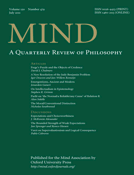-
Views
-
Cite
Cite
Anders Nes, Perception, Hallucination, and Illusion, by William Fish., Mind, Volume 120, Issue 479, July 2011, Pages 856–859, https://doi.org/10.1093/mind/fzr056
Close - Share Icon Share
Extract
William Fish's book defends a naive realist view of veridical visual experience, a disjunctivist account of hallucination, and a mixed view of illusion, combining elements of his accounts of veridical experience and hallucination. Its core thesis is that the phenomenal character of any visual experience — in so far as it has one — consists in being acquainted with mind-independent facts. Fish's central contentions are clearly and carefully presented, their motivations and challenges even-handedly laid out, and interesting responses to the latter are offered. His view is illuminatingly placed in relation to recent discussions in the philosophy of perception.
For Fish, naive realism is a theory of the phenomenal character of veridical visual experience. He adopts as his agreed starting point that the phenomenal character of veridical visual experiences can be characterized in terms of what things — what objects, properties, or other items — are presented to the perceiver. Different views of perception can then be distinguished according to their answer to two questions: (i) what sorts of things are presented, and (ii) how is it that being presented with these things can characterize the phenomenal character of the experience? Naive realists and their chief rivals, representationalists — the only ones Fish considers in depth — agree on (i), at least in so far as they take outer, mind-independent items to be presented, but disagree on (ii). Representationalists say the phenomenal character of an experience consists in the perceiver representing the things she is presented with, while naive realists reply that it consists in her being acquainted with them. Representation and acquaintance differ in their modal profiles. Being acquainted with a property, such as the redness of a rose, requires that the property is ‘instantiated in the part of the environment at which the subject is looking’ (p. 14), whereas representing the property does not.



